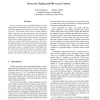Free Online Productivity Tools
i2Speak
i2Symbol
i2OCR
iTex2Img
iWeb2Print
iWeb2Shot
i2Type
iPdf2Split
iPdf2Merge
i2Bopomofo
i2Arabic
i2Style
i2Image
i2PDF
iLatex2Rtf
Sci2ools
108
click to vote
CSFW
2006
IEEE
2006
IEEE
Secrecy by Typing and File-Access Control
Secrecy properties can be guaranteed through a combination of static and dynamic checks. The static checks may include the application of special type systems with notions of secrecy. The dynamic checks can be of many different kinds; in practice, the most important are access-control checks, often ones based on ACLs (access-control lists). In this paper, we explore the interplay of static and dynamic checks in the setting of a file system. For this purpose, we study a pi calculus with file-system constructs. The calculus supports both access-control checks and a form of static scoping that limits the knowledge of terms—including file names and contents—to groups of clients. We design a system with secrecy types for the calculus; using this system, we can prove secrecy properties by static typing of programs in the presence of file-system access-control checks.
Related Content
| Added | 10 Jun 2010 |
| Updated | 10 Jun 2010 |
| Type | Conference |
| Year | 2006 |
| Where | CSFW |
| Authors | Avik Chaudhuri, Martín Abadi |
Comments (0)

